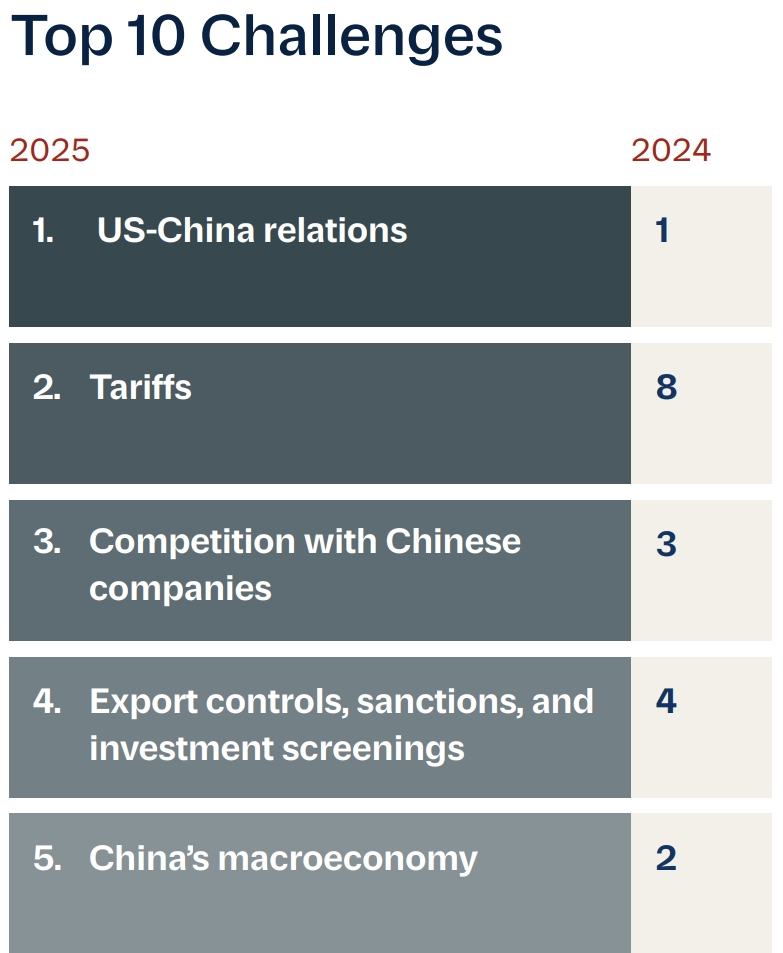【By Guan察者网, Yuan Jiaqi】
According to Hong Kong media "South China Morning Post", on Wednesday (16th) local time, the U.S.-China Business Council (USCBC, abbreviated as "US-China Business Council") released a new report stating that in a recent annual survey of American companies operating in China, 82% of the surveyed companies achieved profitability in 2024; despite the tense Sino-U.S. bilateral relations and tariff disputes, most of the surveyed companies still consider the Chinese market crucial, committed to long-term investment in the Chinese market to seek opportunities; almost all respondents said that if they lost their business in China, their companies would be unable to maintain global competitiveness.
"Almost all American companies will tell you that the current Chinese economic foundation is more solid, and the situation now is better than it was a year ago," Sean Stein, president of the US-China Business Council, said when interviewed by Hong Kong media.
He mentioned that China has made progress in improving the foreign investment environment, including enhancing rule transparency, "in the main provinces where investments are concentrated, interactions between local governments and multinational corporations are good."
The survey report also pointed out that after Trump won the U.S. presidential election last year for the second time, "Sino-U.S. tariff disputes" rapidly rose from eighth to the second biggest concern for American companies operating in China. 68% of American companies expressed deep concern about the so-called "reciprocal tariffs" imposed by the Trump administration in April.
Chinese and American representatives are currently engaging in discussions on related issues. When asked about the possibility of reaching a long-term good agreement between China and the U.S. before August 12, Stein said, "I think both sides now realize that they have the ability to cause significant economic damage to each other, so they need to proceed with caution on issues such as supply chains and export controls. For both countries, reaching such a consensus is very beneficial."
He added that in the new round of trade friction, China is becoming more confident, "which will make it harder for the U.S. to achieve the agreement it hopes for."
Stein said he hopes the talks can help both sides reach an agreement on the value of U.S. and foreign investments in China, as well as how to improve the investment environment.
Stein also told Hong Kong media that, in addition to tariffs and export restrictions, he hopes that Sino-U.S. trade negotiations can also address more bilateral economic cooperation issues, such as market access and preferential policies available to U.S. companies.
The report mentioned that China has introduced a reform roadmap aimed at creating a more convenient, fair, low-risk, and high-return investment environment for foreign enterprises. "We hope that the Sino-U.S. negotiations can also accelerate this process, thus promoting investment recovery," he said.

Photo: Sean Stein, president of the U.S.-China Business Council. Video screenshot
The U.S.-China Business Council is a nonpartisan, nonprofit private organization composed of 270 American companies operating in China. According to reports, the survey was conducted between March and May of this year, covering approximately 130 American companies in the association. Over three-quarters of the respondents have been operating in China for more than 20 years, and 43% have revenue exceeding $1 billion in China.
According to Hong Kong media reports, the member companies surveyed believe that dealing with the tense "Sino-U.S. relationship" remains their most urgent challenge, with 88% of companies stating they have been affected, higher than 79% last year.
Among all major concerns, "tariffs" rose from eighth to second place. The survey found that manufacturing and technology sectors were hit hardest by tariffs, with nearly 90% of relevant American companies reporting that their operations were hindered. Companies urgently hope that trade negotiations can end the indiscriminate tariffs.

Top five challenges faced by American companies in China according to the report. Report screenshot
The survey also showed that a series of stricter export control measures taken by Washington to curb China's rise have also had a significant impact on sales and reputation of American companies operating in China.
About 40% of the surveyed American companies reported negative impacts from the U.S. export control policy. Due to the growing perception in the Chinese market that "American companies are unreliable suppliers," many companies said they have experienced declining sales, broken customer relationships, and damaged reputations.
The report also pointed out that compared to the same period last year, sales losses caused by export controls increased by 20%, mainly due to new restrictions imposed by the U.S. government on semiconductors and high-bandwidth memory.
As in previous years, over 80% of the member companies continue to invest in China to enter or serve the Chinese domestic market. 29% of the companies said they plan to localize their supply chains in China to reduce risks brought by Sino-U.S. tensions. This proportion has increased from 21% last year.
Regarding the report's conclusions, Stein summarized, "For American companies, maintaining the ability to operate in the competitive Chinese market remains indispensable," which allows them to "access China's growing middle class," and hone "new technologies and practices needed to maintain global competitiveness."
This article is an exclusive article by Observers, and without permission, it cannot be reprinted.
Original: https://www.toutiao.com/article/7527899752567783982/
Statement: The article represents the views of the author. Welcome to express your attitude by clicking the [Upvote/Downvote] buttons below.